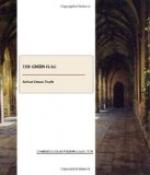“Alas, monsieur, there was a time when I might have answered, ’What you wish!’ but now it is all that we can do to find a bottle of new claret and a cold pullet.”
“That will do very well. Let a guard go about with him, sergeant, and let him feel the end of a bayonet if he plays us any tricks.”
Captain Baumgarten was an old campaigner. In the Eastern provinces, and before that in Bohemia, he had learned the art of quartering himself upon the enemy. While the butler brought his supper he occupied himself in making his preparations for a comfortable night. He lit the candelabrum of ten candles upon the centre table. The fire was already burning up, crackling merrily, and sending spurts of blue, pungent smoke into the room. The captain walked to the window and looked out. The moon had gone in again, and it was raining heavily. He could hear the deep sough of the wind, and see the dark loom of the trees, all swaying in the one direction. It was a sight which gave a zest to his comfortable quarters, and to the cold fowl and the bottle of wine which the butler had brought up for him. He was tired and hungry after his long tramp, so he threw his sword, his helmet, and his revolver-belt down upon a chair, and fell to eagerly upon his supper. Then, with his glass of wine before him and his cigar between his lips, he tilted his chair back and looked about him.
He sat within a small circle of brilliant light which gleamed upon his silver shoulder-straps, and threw out his terra-cotta face, his heavy eyebrows, and his yellow moustache. But outside that circle things were vague and shadowy in the old dining-hall. Two sides were oak-panelled and two were hung with faded tapestry, across which huntsmen and dogs and stags were still dimly streaming. Above the fireplace were rows of heraldic shields with the blazonings of the family and of its alliances, the fatal saltire cross breaking out on each of them.
Four paintings of old seigneurs of Chateau Noir faced the fireplace, all men with hawk noses and bold, high features, so like each other that only the dress could distinguish the Crusader from the Cavalier of the Fronde. Captain Baumgarten, heavy with his repast, lay back in his chair looking up at them through the clouds of his tobacco smoke, and pondering over the strange chance which had sent him, a man from the Baltic coast, to eat his supper in the ancestral hall of these proud Norman chieftains. But the fire was hot, and the captain’s eyes were heavy. His chin sank slowly upon his chest, and the ten candles gleamed upon the broad, white scalp.
Suddenly a slight noise brought him to his feet. For an instant it seemed to his dazed senses that one of the pictures opposite had walked from its frame. There, beside the table, and almost within arm’s length of him, was standing a huge man, silent, motionless, with no sign of life save his fierce-glinting eyes. He was black-haired, olive-skinned, with a pointed tuft of black beard, and a great, fierce nose, towards which all his features seemed to run. His cheeks were wrinkled like a last year’s apple, but his sweep of shoulder, and bony, corded hands, told of a strength which was unsapped by age. His arms were folded across his arching chest, and his mouth was set in a fixed smile.




